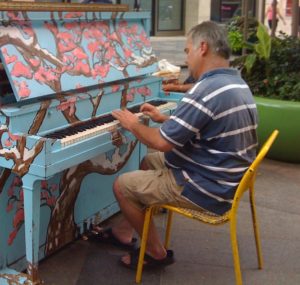Finding The Right Teacher As An Adult
 For adults, finding the right teacher can feel overwhelming. Between juggling your family time, work, chores, and outside activities, there just aren’t a lot of extra minutes for researching and interviewing. Maybe you’ve even started working with a teacher and found that they were the wrong fit, so, now you are reluctant to start the process all over again.
For adults, finding the right teacher can feel overwhelming. Between juggling your family time, work, chores, and outside activities, there just aren’t a lot of extra minutes for researching and interviewing. Maybe you’ve even started working with a teacher and found that they were the wrong fit, so, now you are reluctant to start the process all over again.
Music is missing in your life but decision fatigue wins out. Months go by and you still haven’t gotten help and support for this important part of yourself. It doesn’t have to be that way. Finding the right teacher will take some time and effort on your part for sure. The good news is that in the words of Alton Brown, “Your patience will be rewarded.” Here’s my advice on finding the right teacher as an adult no matter what your level or experience.
- Contact your local music teacher associations. Most are now online with pages dedicated to finding teachers. Call the music departments of local colleges and universities for recommendations. Some may even offer beginning classes in their community music departments. The message boards at local libraries and coffee shops are not always the best resources.
- Find someone who understands and is experienced with adults and how they learn. Each teacher’s studio is unique. Some specialize in children and teens, others in very young children, some in adults, and others in a combination of ages.
- What are your musical goals? Do you want to improve your technique, play for church, play for yourself, learn a Beethoven sonata, read a jazz or pop lead sheet? Teachers are equipped with different skillsets and specialties—from performance based programs, to recreational music making, and everything in between.
- How do you learn best? A teacher who teaches everything by rote and example will not be a good match if you are an analytical learner. That said, a good teacher will teach from your strongest learning style and then push you to develop your weaker modes.
- Are you a social person? Does the teacher offer adult classes or informal opportunities to play with and for other adults? Are they required of every student? Is there pressure to play or can you sit back, observe and give feedback?
- How much time do you realistically have to practice every week? Do you need a teacher who is flexible and can schedule around work, travel plans, or family events? Do you need to take lessons on a bi or tri-weekly basis in order to progress? Please remember that few teachers have the luxury of allowing you to call the day before you want a lesson. Expect that you will need to schedule a few weeks out and be flexible as to time. Teachers may charge a slightly higher rate for non-weekly lessons.
- Are you dealing with a changing body? Do you have special needs? Arthritis, MS, and other medical conditions require that you find a teacher who understands the body and can find healthy, creative ways to help you play within any physical limitations. If you have times when it is hard to travel to the teacher, does the teacher offer lessons via Skype or Facetime?
- Finding a good match in a teacher is a process. Expect to do some interviewing over the phone. Take trial lessons (free and/or paid) with several teachers. Teachers come in all varieties and a teacher isn’t right for you just because they have wonderful credentials. In any studio you are seriously considering, ask if you can come and observe a few lessons. If a teacher will only take you if you sign a contract for a specified number of lessons, you need to consider all your options fully before committing to work with them.
- If a teacher suggests that another teacher might be a better fit, don’t take it personally. Good teachers want the best for you and if they feel it’s not a good match, it’s really not. No one is judging you and if they are, then it’s absolutely not the right fit.


